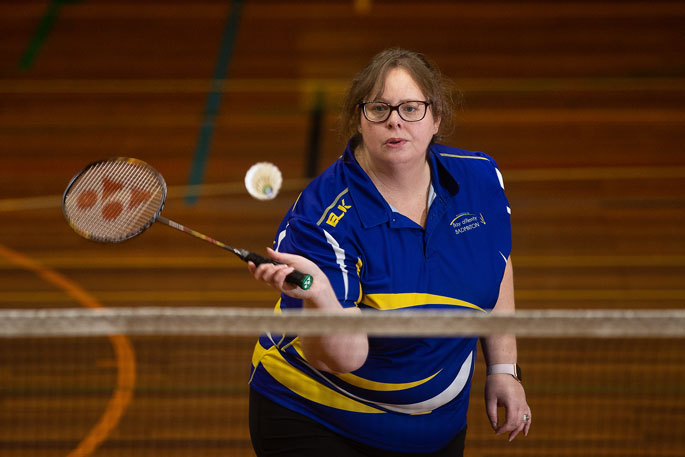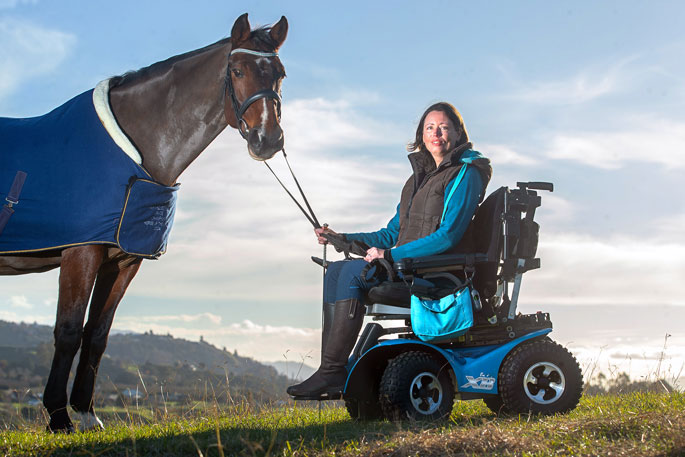Two Tauranga women have been selected to join a nationwide team formed to help para athletes and coaches transition from representative level to high-performance sport.
Tauranga’s Tarryn Espitalier has been selected for the Para Sport Collective as a para badminton coach while Tauriko’s Jodie Thorne is a para equestrian athlete who has been earmarked with potential to qualify for the 2028 Paralympics in Los Angeles.
A further Bay of Plenty resident, Henk Greupink from Rotorua, a para swimming coach, has made it into the collective.
Created by Paralympics New Zealand and supported by ACC, the Para Sport Collective brings together groups of pre-high-performance para athletes and coaches from a variety of sports.
Tarryn, Jodie and Henk are three of 25 athletes and 12 coaches who are part of the second intake of the Para Sport Collective, which begins this month and runs for 12 months, offering three national in-person camps and bi-monthly virtual connections. The purpose is to learn from each other and high-performance sport experts.
More tools
“The course is going to be awesome,” says Jodie. “Before it was created, each athlete had to get their own support crew and figure out what they needed but this is like joining a paralympic team. It will give me more tools and connections, including learning from paralympians. It’s a great initiative.”
The nationwide support network was formed last year. This is the second intake of participants who represent New Zealand’s future talent across 11 of the 29 recognised Paralympic sports. They’ll receive training in nutrition, physiotherapy, media interviews, personal brand and sponsorship, strength training and conditioning.
“It’s learning how, as coaches, we can help the athletes become the best that they can be,” says Tarryn. “It means that if someone with a disability comes to me saying they’d like to go to the next Paralympics, I’ll have the tools to help them do that.”
Jodie has been riding competitively with her current horse Ira Hayes for five years. She was diagnosed with degenerative muscle wasting condition FacioScapularHumeral Muscular Dystrophy when she was 12.
“I was on a marching team and had to throw a baton as part of the routine. I found I couldn’t hold my arms in the air and would fall over when I tried to run in the school beep test. At first, it didn’t affect me much but now I’m in a motorised wheelchair.”
Determined
The 42-year-old is determined to continue riding and competing in dressage events for as long as possible.
“FSHD affects everything from my eyelids down. My core is weak, so I need a lot of equipment to hold me in the saddle.”My team and I try to mitigate the risks as much as we can, but there’s an inherent risk for anyone horse riding and there’s always a risk of falling off.”
The athletes chosen for the collective are those with the best chance of qualifying for the next Paralympics.
 Para badminton coach Tarryn Espitalier wants to help athletes be the best they can be.
Para badminton coach Tarryn Espitalier wants to help athletes be the best they can be.
“The journey looks different for every para athlete, but the para equestrian athlete who was in last year’s intake, Louise Duncan, is now on her way to compete at Paris 2024, so that’s a good indication that it’s a good course. It’s exciting to be part of it,” says Jodie.
Ingredients
Para Sport Collective manager Dale MacDonald says those in the collective become part of a community with such a strong sense of belonging.
“This experience shows them how to make the most of those connections, and about the ingredients involved in becoming successful high-performance coaches and para athletes.”
ACC chief executive Megan Main is pleased to see the Para Sport Collective enter its second year.
“We want to generate opportunities for disabled New Zealanders – many of our clients included – to participate and compete in Para sport. We’re thrilled to be a part of the transformation that’s happening in the Para Sport Collective. I wish the second intake well.”



0 comments
Leave a Comment
You must be logged in to make a comment.